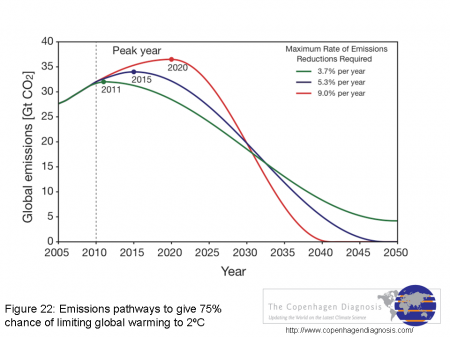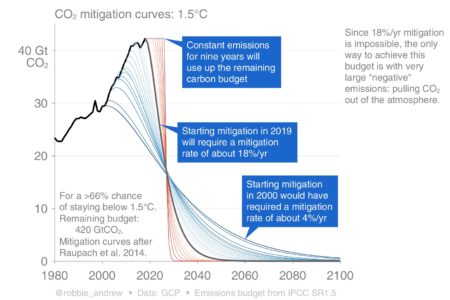Figure from my 2009 blog post, showing why delaying the global peak year for greenhouse gas pollution emissions means having to cut emissions much faster in the 2020s and 2030s to achieve the same temperature target:
Tweeted by Greta Thunberg today:
All this delay mutually reinforces the risks of catastrophes. People keep investing in fossil fuels, so they have more to lose from decarbonization. We keep putting off emission cuts, meaning that their eventual rate will need to be much more draconian than if we had started promptly when the risk of catastrophic climate change became well-recognized in the 1990s. We’re committing ourselves to more severe climate change effects, meaning more forced relocation, severe droughts, extreme weather events, and adaptation costs in general measured in both wealth and lives. We’re missing the chance to build global cooperation and overcome the parochial one-country-mindset mentality that makes global environmental problems into collective action problems.



Thanks for this! It’s hard to imagine a clearer representation of what we face. And, if you look closely, it also re-affirms the fact that we’ve been much too optimistic in the past about what the absolute ceiling for global heating should be. I’m so happy that Greta Thunberg will not mince words, in contrast to our poor Elizabeth May, who still thinks we can “grow” our economy. Economies don’t grow, they consume.
Thank you for this graphic illustration of the situation, and in particular ulnar the effect of delay.
I believe that both Greta Thunberg and Elizabeth May are both important voices raising awareness and seeking action on the need to take much more action on climate change.
“Raising awareness” stopped being an appropriate objective or measure of success many years ago.
Our continued inaction is making success impossible and producing irreversible outcomes which will harm humanity for as long as it continues to exist.
“Latest data shows steep rises in CO2 for seventh year” https://www.theguardian.com/environment/2019/jun/04/latest-data-shows-steep-rises-in-co2-for-seventh-year
This 2016 Policy Options paper by Simon Donner shows CO2 pathways for certain temperature targets for Canada specifically:
It further underscores how Canada’s stated preference for keeping warming below 1.5 ˚C is entirely incompatible with building new long-lived high-carbon infrastructure.
Fighting climate change may be cheaper and more beneficial than we think
…
Co-benefits such as reducing deaths from air pollution and boosting technological innovation may lower the net costs of climate action to zero or even lead to a net economic benefit rather than a cost, studies show.
And failing to take those into account — effectively miscalculating the costs of climate change action — may lead to bad decisions and inaction that are more costly in the long run, says Canadian environmental economist Kirk Hamilton.
“Essentially, we’re just leaving dollars on the table by ignoring co-benefits,” said Hamilton, an economic consultant and visiting professor at the London School of Economics who has studied the co-benefits of climate change mitigation in depth. “In some ways, we’ve been doing the modelling wrong.”
Positive side effects from cutting emissions will occur even if they’re not accounted for, he noted. “You’re just not feeding [them] into your decision making process, which means you’re making bad decisions.”
The UN acknowledged in a 2016 brief on sustainable development that the co-benefits of initiatives to reduce greenhouse gas emissions aren’t always well documented, “which underestimates their positive impact.”
Stopping climate change is only expensive compared to an imaginary world where climate change doesn’t exist. It’s *incredibly cheap* compared to the actual cost of a 3 degree warmer world.
https://twitter.com/ezraklein/status/1199830134687031296
How we underestimate the costs of climate change, and why it matters now
Once you understand the terrible cost of doing nothing, climate action is a bargain
Critics balk at the cost of getting Britain to net zero, but the alternative is so much worse
https://www.theguardian.com/commentisfree/2021/aug/11/climate-action-bargain-britain-net-zero
US hit by 20 separate billion-dollar climate disasters in 2021, NOAA report says | Climate crisis | The Guardian
https://www.theguardian.com/environment/2022/jan/11/us-hit-by-20-separate-billion-dollar-climate-disasters-in-2021-noaa-report-says
Extreme weather has cost Europe about €500bn over 40 years | Extreme weather | The Guardian
https://www.theguardian.com/world/2022/feb/03/extreme-weather-has-cost-europe-about-500bn-over-40-years
Bank of Canada warns of costly risks if climate action is delayed
https://www.nationalobserver.com/2022/01/14/news/financial-regulator-warns-costly-risks-if-climate-action-delayed
What the new IPCC report says climate change could — and is — costing Canadians | CBC News
https://www.cbc.ca/news/science/ipcc-report-canada-1.6371746
Extreme weather caused 18 disasters in US last year, costing $165bn | Climate crisis | The Guardian
https://www.theguardian.com/environment/2023/jan/10/extreme-weather-climate-crisis-us-deaths-financial-damage